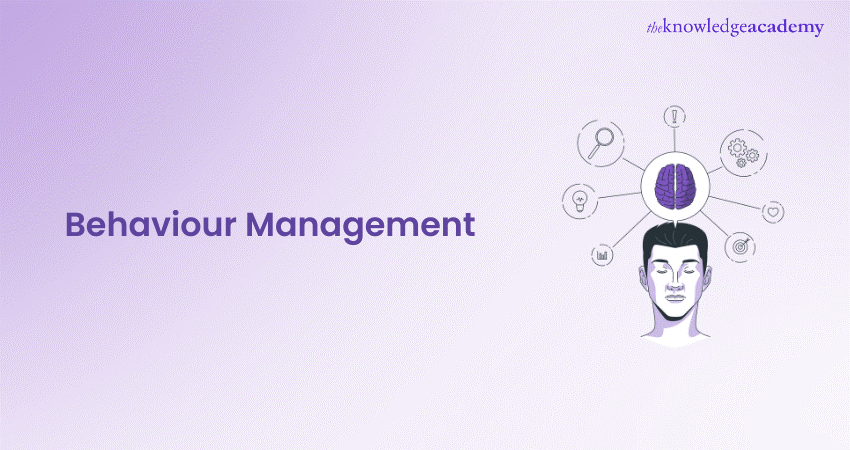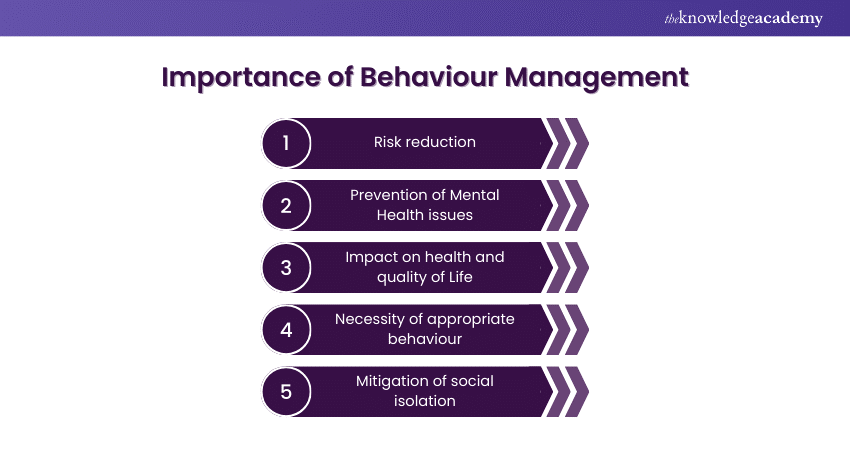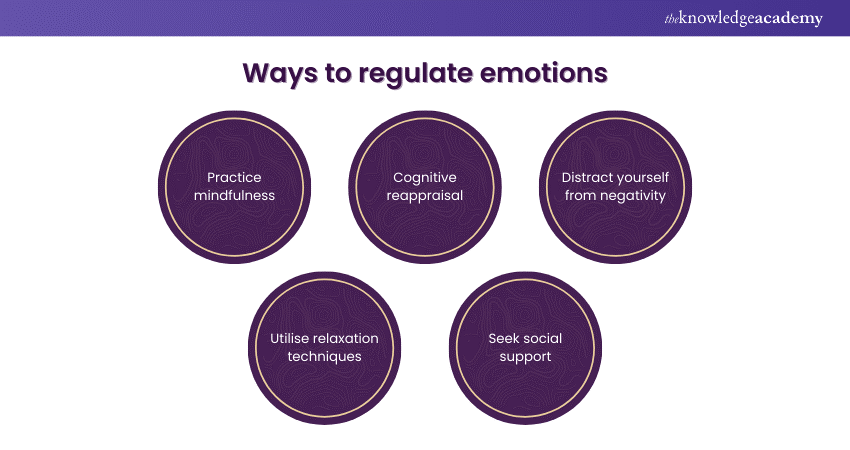We may not have the course you’re looking for. If you enquire or give us a call on 01344203999 and speak to our training experts, we may still be able to help with your training requirements.
Training Outcomes Within Your Budget!
We ensure quality, budget-alignment, and timely delivery by our expert instructors.

Have you ever wondered why some people have more control over their emotions, impulses, and habits than others? Why can some people handle stress, conflict, and change better than others? Why can some people achieve their goals while others might struggle to do so? The answer lies in Behaviour Management.
Behaviour Management is not just about disciplining children or managing difficult employees. It is about understanding the factors influencing our behaviour, such as our thoughts, feelings, beliefs, values, motivations, and environment. It is a great skill that can be learned and improved throughout our lives.
Thus, it is crucial for every professional and human (for that matter) to learn how to manage their behaviour. So, read this blog to learn more! In this blog, we will discuss the value of Behaviour Management and the essential components for developing it as an adult.
Table of Contents
1) What is Behaviour Management?
2) Importance of Behaviour Management
3) Essential components of Behaviour Management
a) Emotional regulation for adults
b) Persistence in adult behaviour
c) Self-regulation in adults
d) Understanding age expectations for adults
4) Conclusion
What is Behaviour Management?
Behaviour Management is the process of understanding and influencing one's own and others' actions and reactions. It involves two aspects: behaviour analysis and behaviour modification. Behaviour analysis is the process of identifying the causes and consequences of our behaviour. It helps us to understand why we behave the way we do and how our behaviour affects ourselves and others.
Behaviour analysis involves observing, measuring, and recording Behaviour and identifying the antecedents (triggers) and the outcomes (rewards or punishments). At the same time, behaviour modification is the process of changing or improving behaviour. Our behaviour achieves the desired outcomes and avoids or reduces undesired outcomes. Behaviour modification involves applying principles and methods of learning, such as reinforcement, punishment, extinction, shaping, modelling, and feedback.
Importance of Behaviour Management
Behaviour Management can be applied to various domains of life, such as personal, social, educational, and occupational. But why is it important? Here are a few reasons Behaviour Management is crucial for you:

1) Risk reduction
Behaviour Management can help us reduce the risk of engaging in harmful or unhealthy activities, like drinking, gambling, or violence. It can also allow us to avoid or cope with the negative consequences of such activities, including financial or health problems.
2) Prevention of Mental Health issues
Behaviour Management can help us to prevent or manage several Mental Health issues, like anxiety, depression, and addiction. It can allow us to identify and challenge irrational or negative thoughts, regulate and express our emotions, and cope with stress and trauma. It can also help us to seek and receive professional help when needed.
3) Impact on health and quality of life
Behaviour Management can help us improve our physical and Mental Health, resulting in an improvement on the overall quality of life. It can help us adopt and maintain healthy habits, such as eating well, exercising, sleeping, and relaxing. It can also enable us to enhance our well-being, happiness, and satisfaction.
4) Necessity of appropriate behaviour
Behaviour Management can help us behave appropriately in different situations and contexts, such as at home, work, or in public. It can enable us to follow rules, norms, and expectations and to respect the rights and feelings of others. It can also help us avoid or resolve conflicts and cooperate and collaborate with others.
5) Mitigation of social isolation
Management of our behaviour can help us overcome or reduce social isolation, which can be a cause or a consequence of poor Behaviour Management. It can help us develop and maintain positive and supportive relationships with family, friends, colleagues, or mentors. It can also enable us to participate in and contribute to society by volunteering, joining clubs, or taking courses.
Want to know how to manage people who aren’t easy to deal with? Sign up for our Dealing With Difficult People Training.
Essential components of Behaviour Management
Behaviour Management is a necessary skill that can be learned and improved throughout life. However, developing the right behaviour as an adult can be challenging due to various factors, like ingrained habits, lack of motivation, limited resources, or competing demands. Therefore, it is crucial to focus on the essential components for managing one’s behaviour as an adult, such as the following:
1) Emotional regulation for adults
Emotional regulation involves managing emotions, predominantly negative or intense ones, such as anger, fear, or sadness. It means recognising, understanding, and accepting one's feelings and expressing them in appropriate and constructive ways.
Emotional regulation is crucial for Behaviour Management, as one's emotions can influence one's thoughts and actions and vice versa. Here are five strategies for improving emotional regulation as an adult:

1) Practising mindfulness is the awareness and acceptance of the present moment without judgment or reaction.
2) Cognitive reappraisal involves changing how we think about a situation or event to reduce its emotional impact.
3) Using distraction is diverting our attention from a negative or stressful stimulus to something more positive or neutral.
4) Using relaxation techniques, like breathing exercises, meditation, yoga, or music, to calm our body and mind.
5) Seeking social support is reaching out to others who can provide emotional or practical help, such as friends, family, or professionals.
Want to practice better emotional intelligence as a manager? Sign up for our Emotional Intelligence Training Now!
2) Persistence in adult behaviour
Persistence is the ability to continue or resume a behaviour despite difficulties, obstacles, or failures. It involves having a clear, realistic goal, robust and positive motivation, and a flexible and adaptable plan. Persistence is essential for Behaviour Management, as it helps us overcome our emotional challenges and setbacks and achieve our desired outcomes. Here are some tips to enhance persistence in adult behaviour:
1) Setting SMART goals, which are Specific, Measurable, Achievable, Relevant, and Time-bound.
2) Identifying and addressing the various barriers and facilitators of behaviour, behavioural factors (e.g., skills, beliefs, attitudes) and external factors (e.g., resources, environment, social influences).
3) Monitoring and evaluating our progress and performance using objective and subjective indicators, such as numbers, ratings, feedback, or feelings.
4) Rewarding ourselves for our efforts and achievements using tangible or intangible incentives, such as money, gifts, praise, or recognition.
5) Learning from our mistakes and failures, using them as opportunities for improvement rather than as reasons for giving up.
3) Self-regulation in adults
Self-regulation is the ability to direct and control our Behaviour and our goals, standards, and rules. It involves self-awareness, self-efficacy, and self-discipline. Self-regulation is vital for Behaviour Management, as it helps us act in accordance with our values and principles and resist temptations and distractions. Here are some ways you can implement self-regulation in your life:
1) Using self-instruction is the process of giving ourselves verbal or written commands or reminders to guide our behaviour.
2) Behaviour monitoring, observing and recording our behaviour for awareness and accountability.
3) Using self-reinforcement, rewarding or punishing ourselves based on our behaviour to regulate our motivation and consistency.
4) Positive self-talking uses positive or motivational statements to influence our thoughts and emotions.
5) Doing self-care for our physical and mental health to enhance our energy and resilience.
Learn to manage stress better as a leader – sign up for our Stress Management Course now!
4) Understanding age expectations for adults
Age expectations are the norms and standards that society or culture has for people of different ages, such as roles, responsibilities, rights, and behaviours. They can vary depending on the context, such as family, work, or community.
Understanding age expectations is essential for Behaviour Management, as it helps us adjust and adapt to the changes and challenges that come with ageing and avoid or cope with the conflicts or pressures that may arise from them. Here are some ways to understand age expectations for better Behavioural Management:
1) Doing research is the process of gathering and analysing information from various sources, such as books, articles, websites, or experts, about the typical or expected behaviour of our age group.
2) Seeking feedback is the process of asking and listening to the opinions or suggestions of others, such as peers, mentors, or professionals, about our behaviour and how it resembles or contrasts with age expectations.
3) Reflecting on our experiences is the process of thinking and writing about our past or present behaviours or responses to age expectations.
4) Experimenting with our behaviour and trying out new or different activities results in our own or others' reactions or satisfaction.
Conclusion
In this blog, we discussed how Behaviour Management is a skill that can help us improve ourselves personally and professionally. It is not something we are born with, but something we can learn and develop throughout our lives. By understanding how to manage our behaviour, we can take charge of our behaviour goals and dreams.
Supervising the behaviour of a new team? Our Introduction To Supervising A Team Course can help! Sign up now!
Frequently Asked Questions

The purpose of Behaviour Management is to establish and maintain a positive and productive environment by effectively addressing and influencing individual or group behaviours. It involves strategies, techniques, and interventions aimed at promoting desirable behaviours and fostering a conducive atmosphere for learning.

The five principles of Behaviour Management provide a framework for effectively guiding and shaping behaviours in various settings, such as educational, professional, or personal. These principles include:
1) Positive reinforcement
2) Clear expectations and consequences
3) Consistency
4) Proactive strategies
5) Individualised approaches

The Knowledge Academy takes global learning to new heights, offering over 30,000 online courses across 490+ locations in 220 countries. This expansive reach ensures accessibility and convenience for learners worldwide.
Alongside our diverse Online Course Catalogue, encompassing 17 major categories, we go the extra mile by providing a plethora of free educational Online Resources like News updates, Blogs, videos, webinars, and interview questions. Tailoring learning experiences further, professionals can maximize value with customisable Course Bundles of TKA.

The Knowledge Academy’s Knowledge Pass, a prepaid voucher, adds another layer of flexibility, allowing course bookings over a 12-month period. Join us on a journey where education knows no bounds.

The Knowledge Academy offers various Business Skills, including 8D Problem-Solving Training, Absence Management and Managing Behaviour Training Course, and Anti-Social Behaviour Management Training. These courses cater to different skill levels, providing comprehensive insights into Compassionate Leadership.
Our Business Skills Blogs cover a range of topics related to Leadership, offering valuable resources, best practices, and industry insights. Whether you are a beginner or looking to advance your Project Management skills, The Knowledge Academy's diverse courses and informative blogs have you covered.
Upcoming Business Skills Resources Batches & Dates
Date
 Successful People Management and Team Leadership
Successful People Management and Team Leadership
Fri 14th Feb 2025
Fri 16th May 2025
Fri 25th Jul 2025
Fri 29th Aug 2025
Fri 10th Oct 2025
Fri 28th Nov 2025







 Top Rated Course
Top Rated Course



 If you wish to make any changes to your course, please
If you wish to make any changes to your course, please


